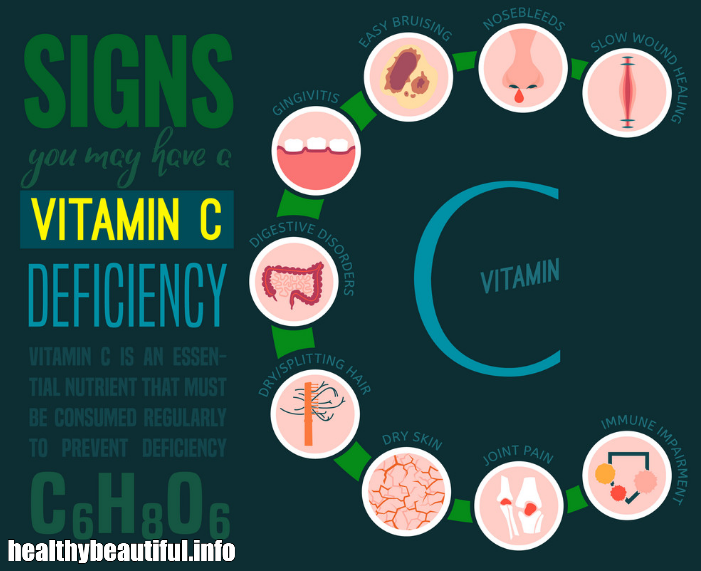As an essential nutrient, vitamin C (ascorbic acid) protects the body against deficiencies in the immune system. The body needs regular doses of vitamin C for prevention against the development of common sickness and serious health problems. But most people don’t get enough of this important nutrient. When the body is low in vitamin C, its symptoms can manifest in many ways. Take a look at some early signs that your body is deficient in vitamin C.
Vitamin C Deficiency: Symptoms and Risks

HERE ARE 9 EARLY SIGNS YOUR BODY IS LOW IN VITAMIN C
“VITAMIN C IS THE WORLD’S BEST NATURAL ANTIBIOTIC, ANTIVIRAL, ANTITOXIN AND ANTIHISTAMINE…” – ANDREW W. SAUL
1. YOUR GUMS SWELL AND BLEED EASILY

Your teeth and gums need adequate amounts of vitamin C for optimum health. This nutrient strengthens the epithelium tissue, which is present all over the body. On the gums, the epithelium works as a barrier against bacteria that might cause dental diseases. If your body lacks vitamin C, your gums tend to swell, become inflamed, and bleed easily. Your gums could also recede. Low vitamin C has been linked to periodontitis, according to a study by the American Society for Microbiology. This disease leads to gum infection and damage that could cause tooth loss as well.
2. YOUR HAIR IS DRY WITH LOTS OF SPLIT ENDS

What vitamin C your body takes in goes to the more important tissues and organs first before the nutrient makes its way to the hair. If your vitamin C levels, however, are less than ideal then your hair roots won’t be able to benefit as much as they need to. So, you end up having dry hair with split ends. Additionally, vitamin C aids in faster hair growth, as it helps the body absorb more iron. A deficiency, therefore, may not just slow down hair growth. It could also lead to hair loss.
3. YOU FREQUENTLY HAVE NOSEBLEEDS

Regular vitamin C intake lessens the fragility of the capillaries. Since the nose is lined with several of these small blood vessels closer to the skin’s surface, then the nose can be quite sensitive. If you experience frequent nosebleeds, you may have inadequate “C” levels in your system. A nosebleed, also known as epistaxis, is one of the symptoms of scurvy, or a condition that highlights the body’s ascorbic acid deficiency.
4. YOU HAVE DRY, ROUGH, AND RED SKIN

Dry, rough, and red skin are also some indications that there is not enough ascorbic acid in your system. Your body needs vitamin C to synthesize with the skin’s collagen, so your skin remains in the pink of health.
The lack of “C” might also lead to the development of a skin condition called keratosis pilaris. Although most common among young people, this condition can occur at any age. It is characterized by rough patches or tiny bumps that appear on the thighs, buttocks, upper arms, and cheeks.
Keratosis pilaris can cause mild itching. While it doesn’t hurt and it’s not a serious condition, the sandpaper roughness could be uncomfortable. Moisturizers and lotions with vitamin components help treat dry skin and lessen the wrinkles.
5. YOU’RE PRONE TO BRUISING

Because your capillaries are weaker without vitamin C, a simple bump might result in instant bruising. Are there instances when you don’t know how you got your bruises on the thighs or arms? Now, you have an explanation for it – your body probably lacks vitamin C. According to the University of Michigan Health Systems, bruising might also indicate an underlying health condition. Experts recommend that aside from eating foods rich in vitamin C, take daily supplements of about 400 mg “C” along with 400 mg of flavonoids.
6. YOUR WOUNDS HEAL SLOWLY

Do you have cuts or scrapes that have lingered for weeks? Have you gotten surgery and still feel some tenderness around the wound? It might not be healing fast because you don’t have enough vitamin C that helps the connective tissues bind with the wound. “C” has an important role in tissue repair, as per the Journal of Dental Research. It can also prevent infection of wounds.
7. YOU HAVE PAINFUL, SWOLLEN JOINTS

Joints that swell with pain could be inflamed. This is common for those who suffer from rheumatoid arthritis. According to the Arthritis Foundation, people with low vitamin C levels have three times the risk of developing this disease compared to those with a regular Vitamin C intake.
8. YOU’RE SUSCEPTIBLE TO COLDS AND FLU

Vitamin C helps with the production of white blood cells that attack virus and bacteria. It’s also an antioxidant that protects your cells from infections. If your body is low in “C”, you’re likely susceptible to the common cold, and you’re weak against the flu virus or strep throat infection.
9. YOU’RE TIRED AND IN LOW SPIRITS

Ever find yourself easily tired and in low spirits and you can’t explain why? Vitamin C deficiency has been proven to have psychological links as well. Separate studies in hospitalized patients and high school students with anxiety showed that their mood became more positive by as much as 34 percent after taking vitamin C supplements.
Vitamin C Myths and Facts: Separating Truth from Fiction
Myth 1: Vitamin C is the Common Cold Ally
Fact: Think of Vitamin C as that friendly neighbor who lends you an umbrella when it’s raining. It won’t keep the common cold away completely, but it’s like that neighbor’s umbrella – it helps you stay a bit drier and more comfortable. Taking it regularly is like knowing your neighbor always has an umbrella to share.
Myth 2: Vitamin C is the Magic Cure for Cancer
Fact: Imagine Vitamin C as a trusted friend who listens and supports you through tough times. It’s there for you, but it can’t perform miracles. The journey through cancer is intricate and requires a team of experts.
Myth 3: You Can Never Get Too Much Vitamin C
Fact: Picture Vitamin C as your favorite dessert. A small portion is delightful, but devouring the entire cake can lead to an uncomfortable fullness. It’s like savoring a slice instead of overindulging.
Myth 4: All Vitamin C Supplements are Identical
Fact: Not all Vitamin C supplements are alike. Some are like the reliable brands you trust, while others may not be as dependable. Choosing the right one is like selecting a trustworthy friend, and seeking advice from a healthcare professional is akin to consulting a wise mentor.
Myth 5: Oranges are the Vitamin C Stars
Fact: Oranges are like the lead actors in a blockbuster movie, but there’s an entire ensemble of fruits and veggies ready to share the stage. Strawberries, kiwi, bell peppers, and broccoli are like the supporting actors, creating a diverse cast of nutrients in your diet.
Myth 6: Vitamin C is Only for Immune Health
Fact: Think of Vitamin C as a multi-talented artist. It’s not just the singer; it’s also the painter, writer, and dancer. It plays various roles in your health, from building the strong foundation of collagen to guarding your skin, acting as a robust antioxidant, supporting iron absorption, and potentially contributing to heart and brain health.
Myth 7: Plant-Based Diets Lack Vitamin C
Fact: Plant-based diets are like a treasure hunt for Vitamin C. Fruits and veggies are like hidden treasures, waiting to be discovered. Citrus fruits, leafy greens, bell peppers, and more are like the precious jewels in your dietary treasure chest.
Myth 8: Vitamin C is the Universal Miracle Cure
Fact: If Vitamin C were a tool, it would be your versatile Swiss Army knife. It’s incredibly useful, but it can’t work miracles on its own. Achieving overall health requires a full toolkit, including a balanced diet and a healthy lifestyle.
Conclusion
The best way to increase your vitamin C intake is by naturally adding this to your diet. Eat or drink plenty of fruits and vegetables – such as broccoli, capsicum, kale spinach, berries, and citrus fruits – to boost your body’s daily “C” requirements.
You get more benefits from eating fruits fresh, instead of juiced or blended. Studies have also shown that overcooking vegetables may reduce their nutritional value. So, make sure to add vegetables in soups and stews when it’s already boiling, and not before.
FAQ
How much Vitamin C do I need daily?
The recommended daily intake of Vitamin C varies by age and sex but is generally around 75-90 milligrams for adults. However, individual needs can vary based on factors like age, health status, and lifestyle.
Can Vitamin C prevent or treat the common cold?
While Vitamin C may help reduce the duration and severity of a cold in some people, it’s not a guaranteed cure or preventive measure. Maintaining overall health and a balanced diet is important.
Is it safe to take Vitamin C supplements during pregnancy?
It’s generally safe for pregnant women to get their Vitamin C from a well-balanced diet. However, if you’re considering Vitamin C supplements during pregnancy, it’s advisable to consult with a healthcare provider.
Can Vitamin C be used to prevent or treat scurvy?**
Yes, Vitamin C is the primary treatment and prevention for scurvy, a disease caused by a deficiency in this vitamin. Scurvy can lead to symptoms such as bleeding gums, fatigue, and joint pain.
Is it true that Vitamin C can help reduce the risk of chronic diseases, such as heart disease and cancer?
Vitamin C’s antioxidant properties may contribute to reducing the risk of chronic diseases by protecting cells from damage. However, it’s just one factor among many that influence disease risk, and a balanced diet and healthy lifestyle are essential.
Does cooking or heating foods affect their Vitamin C content?
Yes, exposure to heat, light, and oxygen can degrade Vitamin C in foods. To retain as much Vitamin C as possible, consider cooking vegetables lightly or consuming them raw.
Can Vitamin C be used to lighten or brighten skin?
Topical Vitamin C may help improve skin complexion and reduce the appearance of dark spots or hyperpigmentation, but its effects can vary from person to person.
Some research suggests that Vitamin C may help reduce the risk of eye diseases, but more studies are needed to confirm its effectiveness.
Can Vitamin C help with allergies or asthma?
Some studies suggest that Vitamin C may have a mild antihistamine effect, which could be beneficial for allergy symptoms. However, it’s not a substitute for prescribed allergy or asthma medications.
What is the role of Vitamin C in the body’s response to stress?
Vitamin C may help mitigate the physical effects of stress by supporting the adrenal glands, which produce stress hormones. However, it doesn’t directly reduce psychological stress.

